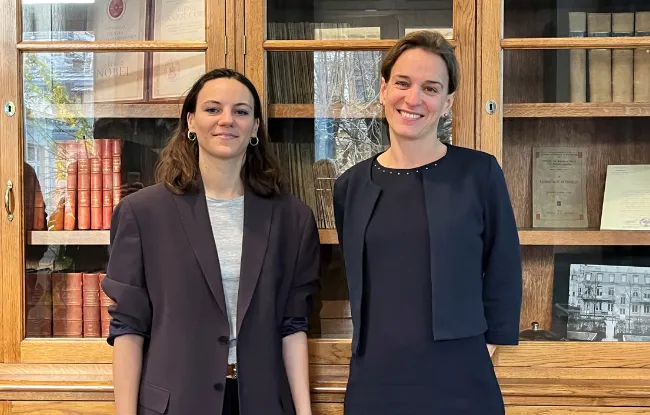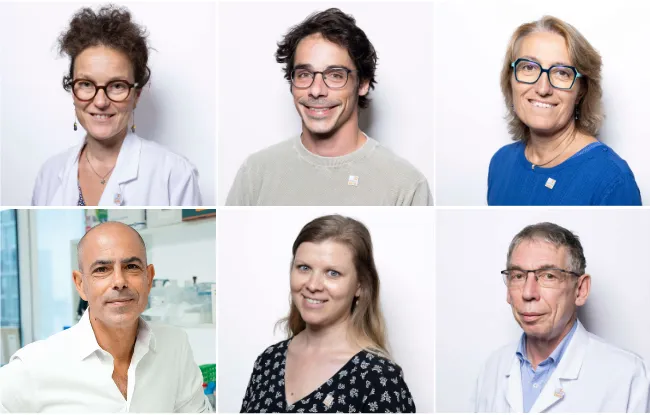- Home >
- Institut Curie News >
- Innovating for better care: Institut Curie receives double recognition in AstraZeneca's In'CaRe call for projects
Dr. Jill Pilet, postdoctoral fellow at the Research center and Dr Anne-Sophie Hamy-Petit, gynecologist-oncologist and researcher at the Hospital group, are the winners of Institut Curie in the In’CaRe call for projects launched by AstraZeneca France. This program supports innovative projects in cancer research or in improving the course of care. This recognition underlines the excellence and the innovative potential of the work carried out at Institut Curie and provides decisive support to develop new therapeutic strategies for the benefit of patients.
Two projects from Institut Curie are among the six winners selected out of 108 applications1, as part of the In'CaRe call for projects. Launched in 2023 by AstraZeneca France, this program aims to support innovative initiatives in cancer research and in improving the care pathway, with funding of up to 160,000 euros per project. "We are proud of this double recognition which illustrates the excellence of the work carried out at Institut Curie and its innovation potential," declares Dr. Cécile Campagne, director of Institut Curie's Technology Transfer Office and deputy director of the Carnot Curie Cancer. “This distinction highlights the importance of fundamental research, the true foundation of innovation, and the need to optimize care pathways, a key lever for improving patient management. By combining these two dynamics, we can truly accelerate the fight against cancer.”
EpiKidsBCS: a pioneering project to better treat rare pediatric sarcomas
Dr. Jill Pilet, postdoctoral fellow at Institut Curie Research center in the Mechanisms of oncogenesis of childhood tumors unit (CONCERT, Institut Curie/Inserm), was distinguished in the "Oncology research" category for EpiKidsBCS, her fundamental project that probes the processes at the origin of rare pediatric sarcomas. These cancers, recently recognized, remain very little studied and do not have specific treatments.
These rare tumors develop from very few genetic abnormalities. Often, a single chromosomal rearrangement merges two genes and produces a protein that promotes the development of the tumor. In the case of BCOR::CCNB3 sarcomas, specifically studied by Dr. Jill Pilet, this protein modifies the epigenome2 (marks on the DNA, folding of the molecule, etc.), which disrupts the expression of many genes3.
Jill Pilet's project explores these epigenetic mechanisms in order to pave the way for new therapeutic strategies. “Understanding these mechanisms will allow us to clarify the protein’s mode of action and identify molecules capable of blocking its effects. This research could also uncover similarities with other pediatric cancers for which epigenetic treatments already exist,” declares the researcher. “Today, children receive chemotherapies designed for other sarcomas, such as Ewing sarcoma. Receiving this Award therefore represents great hope for these young patients: it will give us the means to deepen our work and pave the way for targeted therapies that are better adapted to their disease.”
Learn more about pediatric sarcomas
“e-Sentinelle”: improving post-breast cancer monitoring and early detection of relapses
Awarded in the "Course of care" category, the "e-Sentinelle" project led by Dr. Anne-Sophie Hamy-Petit, oncologist and researcher at Institut Curie Hospital Group in the Tumor residue and treatment response team (Translational research department, Institut Curie/Inserm), aims to improve follow-up after breast cancer thanks to a digital platform.
The project was born from several observations, explains Dr. Hamy-Petit: "Breast cancer patients express a real lack of information about the signs of relapse and wish to be better supported. Secondly, care reimbursement data constitute a very rich resource, still underutilized, which covers almost all patients monitored in France. Finally, the data reported by the patients themselves (symptoms, side effects, quality of life) perfectly complement this information." The platform developed within the framework of the project crosses these two types of data, offering a more precise and more reliable vision of the patient's journey.
"The funding obtained thanks to In'CaRe will accelerate the development of the platform. This will strengthen the link between caregivers and patients, and facilitate the identification of warning signs between two consultations. Our goal: to improve adherence to treatments and the monitoring schedule, while detecting relapses earlier," states Anne-Sophie Hamy-Petit.
By offering simplified access to information, this tool also represents a major asset for isolated people or people living in territories where access to health centers remains difficult.
Learn more about breast cancers
[1] For its second edition, the program has collected 108 applications from health institutions, higher education and research institutions, and patient organizations.
[2] The epigenome is the set of epigenetic modifications of a cell.
[3] Pierron G, Tirode F, Lucchesi C, Reynaud S, Ballet S, Cohen-Gogo S, Perrin V, Coindre JM, Delattre O. A new subtype of bone sarcoma defined by BCOR-CCNB3 gene fusion. Nat Genet. 2012 Mar 4;44(4):461-6. doi: 10.1038/ng.1107. PMID: 22387997.



